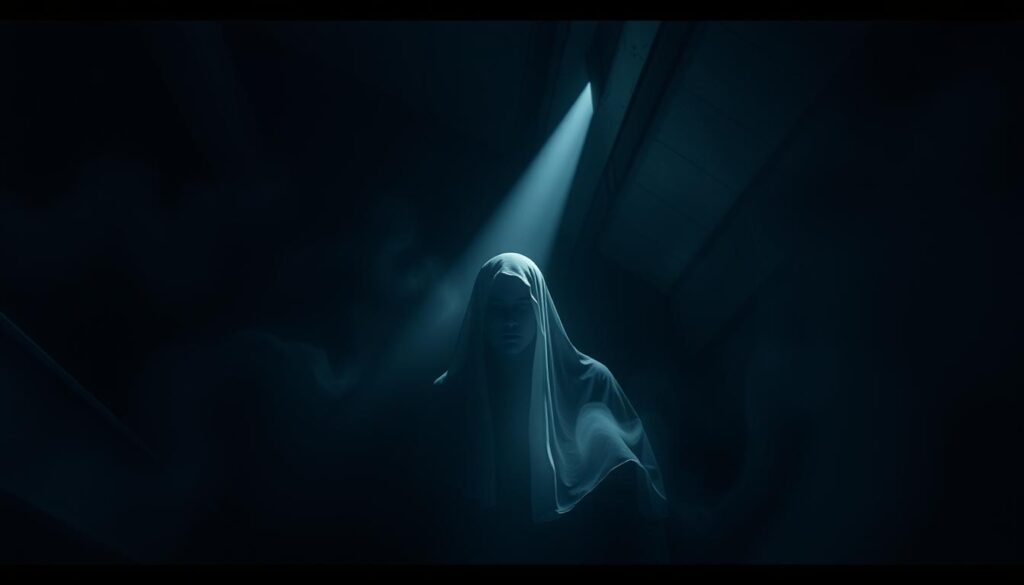People Who Predicted Their Own Deaths, Death premonitions have always been intriguing. Many want to know about mortality awareness and terminal illness. Throughout history, people have shared their experiences of predicting their own deaths. These stories are fascinating and continue to capture our interest.
From ancient times to today, the idea of knowing when you’ll die has been a topic of interest. Many are curious about the science behind death premonitions and how we become aware of our mortality.

These stories give us a glimpse into the human experience. They make us think about the role of intuition and subconscious knowledge in facing death. By looking into these stories, we can better understand death premonitions and how they’ve been seen and recorded through history.
Introduction to Death Premonitions
We will explore the world of death premonitions. We’ll look at the psychology behind predicting death and how different cultures view death awareness. We’ll also examine famous cases of deathbed predictions and the science behind terminal lucidity. All of this will focus on mortality awareness and terminal illness.
Key Takeaways
- Death premonitions have been reported throughout history, with many individuals experiencing terminal illness and mortality awareness.
- These stories provide insight into the human experience and raise questions about the role of intuition and subconscious knowledge.
- Death premonitions have been perceived and documented in various ways throughout history, reflecting different cultural perspectives on death awareness.
- The psychology behind death predictions is complex, involving factors such as self-fulfilling prophecies and medical understanding of terminal awareness.
- Notable cases of deathbed predictions and the science behind terminal lucidity offer a fascinating glimpse into the mysteries of mortality awareness and terminal illness.
- By exploring these remarkable stories, we can gain a deeper understanding of death premonitions and their significance in human experience.
Understanding Death Premonitions Throughout History
Death premonitions have been a part of human culture for centuries. Different societies have their own beliefs about this phenomenon. To understand death premonitions better, we need to look at history and culture. Psychic predictions and near-death experiences have given us valuable insights into human life.
In ancient times, people believed in fate and destiny. The ancient Greeks, for example, believed in Moira, or fate, set by the gods. Today, many still believe their lives and deaths are predetermined.
The ancient Egyptian Book of the Dead and Plato’s writings on reincarnation show death premonitions’ long history. These examples highlight how different cultures have viewed death premonitions over thousands of years.
By studying these beliefs and historical records, we can understand death premonitions better. This knowledge helps us appreciate the mystery and complexity of death premonitions.
Famous People Who Predicted Their Own Deaths
History is filled with famous people who knew they were going to die. Their predictions have left us with a mix of mystery and intrigue. Politicians and artists alike have shared their death predictions, often with chilling accuracy.
Abraham Lincoln had a dream about his assassination. Alan Turing foresaw his death by cyanide poisoning. These cases have captivated many, making us wonder about the reasons behind these predictions.
Studying these famous deaths helps us understand the psychological and emotional sides of predicting one’s own demise. It shows us the complex and mysterious nature of these predictions.
- Abraham Lincoln: predicted his own assassination
- Alan Turing: predicted his own death by cyanide poisoning
- Mark Twain: predicted his own death on the anniversary of Halley’s Comet
These stories highlight the fascinating world of predicted deaths. They keep us thinking about mortality and the lives of the famous.
The Psychology Behind Death Predictions
Understanding death psychology is complex. It involves looking into the human mind and what makes us predict death. Studies show that our views on death are shaped by our inner thoughts and beliefs.
Self-fulfilling prophecies are a big part of death psychology. This means our thoughts can change our actions and shape our reality. In death predictions, this can show up as our gut feelings and hidden knowledge about death.
Factors Influencing Death Predictions
- Intuition and subconscious knowledge: These can greatly affect how we see death and dying.
- Medical understanding of terminal awareness: Doctors know a lot about the changes people go through when they’re close to death.
- Psychological factors: Things like anxiety, depression, and fear can also change how we see death and predict our own.
Looking at these factors helps us understand why we make death predictions.
Death psychology is a deep and interesting field. By studying what leads to death predictions, we learn more about the human mind and the mysteries of death.
Documented Cases of Deathbed Predictions
Research on deathbed predictions shows amazing stories of people who knew they were about to die. These individuals, facing terminal illness, were surprisingly calm and accepting. Their stories give us a glimpse into the human experience.
Some people even predicted the exact time and date of their death. These predictions are rare but have been documented. Mortality awareness is key, as these individuals showed a deep acceptance of their fate.
Studies on terminal illness reveal a unique awareness of death among some. This awareness can lead to deathbed predictions. These predictions can include details like who will be there and how they will pass away. Looking into these cases helps us understand the mysterious nature of deathbed predictions.
Factors like terminal illness, mortality awareness, and mental state play a role in these predictions. By studying these, researchers aim to uncover what drives these predictions. This can help us better understand our own mortality.
Modern Examples of Accurate Death Premonitions
In recent years, many reports of modern death premonitions have amazed healthcare professionals and researchers. These cases happen in medical settings. Patients there predict their own deaths, even when doctors try to save them.
Healthcare workers have seen patients calm and accepting of death. These patients often know when their time is coming. They might even predict the details of their death.
For example, some patients have guessed the exact time and date of their death. Others have asked for specific funeral arrangements. These stories have made people curious about death premonitions and what they mean for us.
There are a few theories about modern death premonitions. Some think it’s about intuition and subconscious knowledge. Others believe patients might be tapping into a shared unconscious. More research is needed to understand these phenomena. But they give us a peek into the mysteries of human consciousness and death.
The Science Behind Terminal Lucidity
Terminal lucidity is when people suddenly get better in mind and body right before they die. It’s seen in many cases, making scientists curious about the science of death. They want to know more about the brain and how we die.
Studies show that terminal lucidity often comes with a deep awareness of death. People start to see how short life is. This awareness can make them clear their minds and find peace before they go.
Some signs of terminal lucidity include:
- Clearer thinking and focus
- More strength and movement
- Deeper feelings and sensitivity
- A feeling of peace and acceptance

The exact reasons for terminal lucidity are still a mystery. But research points to brain changes, especially in areas for emotions, motivation, and memory. More research could help us understand the science of death and our feelings about dying.
Cultural Perspectives on Death Predictions
Death predictions are seen differently around the world. Cultural perspectives shape how we view death and what comes after. From eastern philosophy to western views, each culture has its own take on death predictions.
Studies show that cultures have their own beliefs and ways of dealing with death. Some believe in an afterlife, while others do not. These beliefs are shaped by eastern philosophy and western views on life and death.
Some important parts of cultural perspectives on death predictions include:
- Beliefs about the afterlife
- Practices surrounding death and mourning
- Influence of eastern philosophy and western views on death predictions
Looking into these cultural perspectives helps us understand death predictions better. It shows the variety of human experiences and beliefs about death and the afterlife.
Skeptical Analysis of Death Predictions
Looking into death predictions, we must be careful and think critically. We need to consider statistical probability and coincidence. A skeptical analysis helps us tell real facts from false claims, showing the value of critical thinking.
Examining debunked cases and misunderstandings gives us important insights. It helps us see the psychological and social sides of death predictions.

When we check out death predictions, here are some things to keep in mind:
- The chance of coincidence and statistical probability in the prediction
- The risk of misreading or overstating events
- The need to check facts with trusted sources
By being skeptical, we learn more about death predictions and what shapes our views. This helps us deal with the complex world of death predictions, taking into account statistical probability and debunked cases.
Common Patterns in Verified Death Predictions
Studies on verified death predictions show some common patterns. These patterns help us understand the complex nature of knowing when we will die. One pattern is the role of intuition. People sometimes feel they are going to die, even without any medical reason.
This feeling can come from our subconscious mind. It’s like our mind knows things we’re not aware of.
Another pattern is the medical understanding of terminal awareness. This is when people with serious illnesses know they are going to die. This awareness comes from their body’s response to the illness and their emotional state. By looking at these patterns, we can better understand how people know they are going to die.
Some common patterns in verified death predictions include:
- Increased sense of intuition and subconscious knowledge
- Heightened medical understanding of terminal awareness
- Emotional and psychological preparation for death
By recognizing these patterns, we can improve our understanding of death predictions. This knowledge helps us care for people better at the end of their lives. It allows them to face death with dignity and acceptance.
Conclusion: Understanding the Mystery of Death Premonitions
As we wrap up our look into death premonitions, it’s clear they are full of mystery. Many people claim to have had accurate predictions, but scientists are still unsure. This topic fascinates and scares many at the same time.
We’ve looked at many sides of death premonitions, from old stories to today’s tales. We’ve also talked about the psychology behind these predictions. It seems death premonitions are complex, with no one answer.
Some important things to think about when looking into death premonitions include:
- The importance of death premonitions in different cultures and historical contexts
- The psychological and scientific views on this topic
- The need for more research into this area
In conclusion, death premonitions are a captivating and mysterious subject. As we keep learning about them, we might find new ways to understand life and death.
Stories of people predicting their own deaths are eerie reminders of fate and history’s mysterious patterns. Similarly, history has witnessed shocking moments that repeated themselves, making us question whether some events are simply destined to recur.
Final Thoughts on Death Predictions
As we wrap up our look at death predictions, it’s key to keep an open mind and think critically. Some stories are hard to explain, but our grasp of life and death is always growing. This is a journey of discovery.
Knowing we’ll all die can change us deeply. It makes us live more fully and cherish every moment. The stories of people predicting their own deaths show us there might be a hidden link between our minds and death.
Let’s keep diving into this fascinating subject with curiosity and a willingness to learn. By exploring death predictions, we might gain insights into what makes us human and our place in the world.
FAQ
What is the significance of death premonitions throughout history?
Death premonitions have been a part of human culture for centuries. Ancient civilizations and historical figures often documented their ability to predict their own deaths. These premonitions have fascinated people across different cultures and societies.
They have led to a deeper understanding of the complex relationship between the mind, the body, and the process of dying.
Who are some famous individuals who accurately predicted their own deaths?
Throughout history, many famous people have accurately predicted their own deaths. Examples include Abraham Lincoln, Alan Turing, and other notable figures. Their stories provide a glimpse into the psychological and physiological factors behind death predictions.
What is the science behind terminal lucidity, and what does it reveal about the human brain?
Terminal lucidity is when some individuals experience an unexpected improvement in mental and physical condition shortly before death. The science behind this phenomenon has been researched extensively. It may offer insights into the complex workings of the human brain and the dying process.
How do different cultures view and understand death predictions?
Cultural perspectives on death predictions vary widely. Eastern philosophies, Western views, and indigenous beliefs all offer unique perspectives. Understanding these diverse cultural perspectives can provide a more comprehensive understanding of the human experience of death and the afterlife.
What are some common patterns found in verified cases of death predictions?
While death predictions can be complex, certain common patterns emerge in verified cases. These include the role of intuition, subconscious knowledge, and medical understanding of terminal awareness. Identifying these patterns can help shed light on the underlying mechanisms behind death premonitions.
How can we approach death predictions with a critical and skeptical mindset?
It’s important to approach claims of death predictions with a critical and skeptical mindset. Not all cases can be taken at face value. Factors such as statistical probability, coincidence, and debunked cases must be considered when evaluating the validity of death predictions.
By maintaining a balanced and analytical perspective, we can better understand the complex nature of this phenomenon.
Source
https://blog.redbubble.com/2014/01/6-artists-who-predicted-their-own-deaths/?utm
https://blog.redbubble.com/2014/01/6-artists-who-predicted-their-own-deaths/?utm
